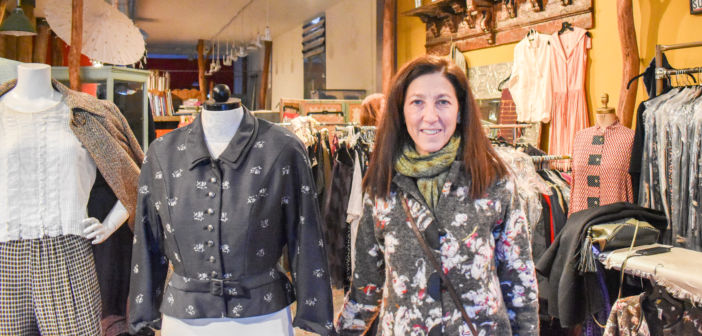When Marla Duran was in her early 20s — a time when most people are starting their first jobs or completing their studies — she spent several months working as an au pair for a Parisian family and attending mime classes with fellow expats.
The aspiring artist dropped out of George Washington University in favor of pursuing a more creatively fulfilling path — taking ceramics classes, learning French, traveling to Europe.
In her travels, Duran found beauty and inspiration in the everyday.
“Living in France, daily life had finesse,” she said. “The fruit was good and the water you drank was good, and I think all the little details influenced me.”
At the time, Duran had not yet considered becoming a clothing designer, but the experiences she had abroad had a profound, lasting influence on her approach to fashion.
“In those days, the way the French women dressed was they didn’t buy a lot, but they bought good things, and it wasn’t uncommon to wear the same thing a few days in a row,” she said. “I think that influenced me — the focus on quality and not quantity.”
Duran is now a seasoned veteran of the fashion industry, having designed her own line of women’s clothing for several decades. The path of her career trajectory, however, has been anything but linear.
Upon returning from Europe, Duran was rife with inspiration.
She worked for several months as a waitress in her hometown of Allentown, making ceramics in her free time, then spontaneously decided to move to southern California. There, she soon met the man who would become her husband, and they had a baby boy named Raphael.
After she became a mother, Duran began to channel her creative energy into making children’s clothing, which she then sold to stores in Los Angeles. This marked the beginning of her career as a designer.
When she returned to the Lehigh Valley a few years later, Duran decided to make fashion her livelihood and started her own line.
Raphael said he admires his mother’s tireless pursuit of her passion.
“When you have your own small business and you design on your own, you have to wear all those hats,” he said. “There’s nobody to pin the garment, you might have to grab one of your friends to be your model, you might need to drive down to Philadelphia to pick up fabric…all those little details that go into creating a piece of your art, she did herself.”
Though Duran has had a shop on Bethlehem’s East Third Street for nearly two decades, Marla Duran Design has never been confined to the Valley. For years, she has spent most of her time traveling the country and presenting her designs at craft shows and high-end art fairs.
Most pieces in Duran’s line are made of rayon fabrics and have a “retro” appeal, as she often combines bold patterns with vintage design elements. Rather than trying to keep up with trends, she prefers to create timeless pieces that can become long-wearing staples in any woman’s wardrobe.
Most of the clothing is handmade by a seamstress in the Lehigh Valley. Duran also works to customize the fit of each piece for her clients.
“It’s satisfying when I see women loving my clothes and finding something and then they wear it and get a lot of compliments, and they come back and say, ‘I just want to tell you, I love what I bought from you,’” Duran said.
Though she is usually on the road, Duran also has a few local customers.
Sloan Wertman, who works in downtown Bethlehem, often passed by Duran’s storefront and was intrigued by what she saw. Because the store was usually closed when she tried to stop in, she decided to call and set up an appointment when Duran was in town.
Wertman was drawn to the atmosphere of Duran’s workspace.
“I’m an architect, so a lot of things that she does interest me because of the form or structure or materiality of them,” Wertman said. “In her shop, she has some mockups in paper and things like that. Those are the things that I found interesting — how she translates that into clothes.”
As a local customer, Wertman’s shopping experience differs from that of Duran’s craft show clients, because she gets a more behind-the-scenes perspective of Duran’s work.
“I see something on the rack, I try it on, we look at it and say, ‘How about we do this, we don’t do this,’ and so on, and she’ll make a piece for me,” Wertman said. “I think it’s more personalized for me. So, I would say that my interaction with her is completely different than most people’s, and I prefer the way I have it.”
Duran’s work reached a new audience when she appeared on the second season of the reality show “Project Runway” in 2005-2006. Though she finished in 10th place, she said the competition was a valuable learning experience that took her out of her comfort zone as a designer.
“One of the early challenges, they told us to get dressed up – that we were going to a party – and they took us to a club and they said that we were going to have to take the clothes we were wearing and cut them up and redesign them into a look,” she said. “…there was always some unexpected thing that was going on.”
The reality show stint gave Duran a newfound notoriety on the road. Shoppers would often stop by her booth at craft shows because they recognized her name.
One of those people was Lindsey Altongy, who had watched Duran’s season of “Project Runway” when she was in middle school and recognized her at the “One of a Kind” craft show in Chicago in 2016.
The two hit it off, and Duran later hired Altongy to establish an online presence for her collection.
Though she has long been reluctant to do so, Duran is coming to recognize the value of promoting her work online.
“I think part of the challenge (of shifting to e-commerce) is conveying the appeal of items in person, online – it’s translating the experience to a digital platform that’s difficult,” Altongy said. “I think the approach for (Duran) is to maintain this kind of artistic, hand-made flare that she has, and to bring that style to the internet – so it still feels personable, you still get the small business experience, even though it’s online.”
She worked with Duran to set up an e-commerce site and list some of her pieces on websites like Etsy and eBay. Their hope is to reach Duran’s loyal clientele around the country, as well as attract new customers through social media campaigns.
Looking forward, Duran is keeping her options open. Maybe she’ll move to Philadelphia, or try to sell her work in Japan.
She doesn’t have a concrete game plan. After all, so much of her career has been unscripted.
“I’ve been at this for a long time, and I am getting older,” she said. “It’s almost like I’m waiting to be discovered, but I realized that if I want anyone to know I’m here, I have to let them know. I feel like I still have more to say in what I do.”






Comment policy
Comments posted to The Brown and White website are reviewed by a moderator before being approved. Incendiary speech or harassing language, including comments targeted at individuals, may be deemed unacceptable and not published. Spam and other soliciting will also be declined.
The Brown and White also reserves the right to not publish entirely anonymous comments.